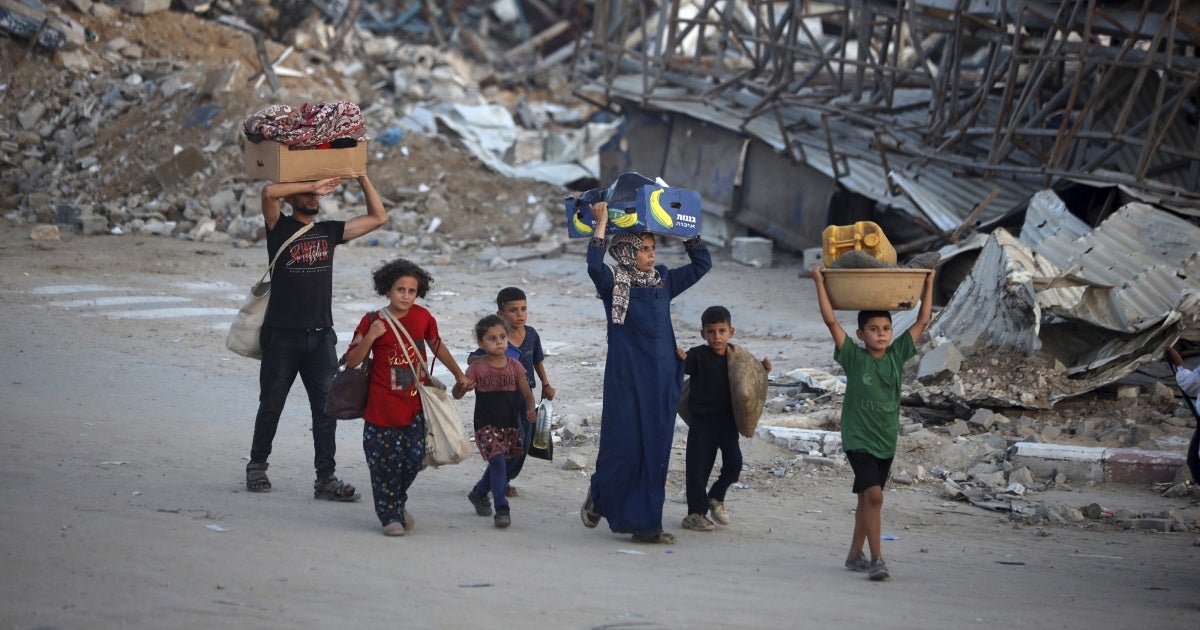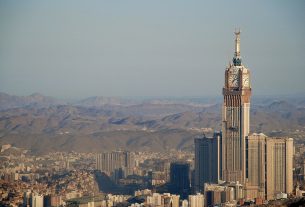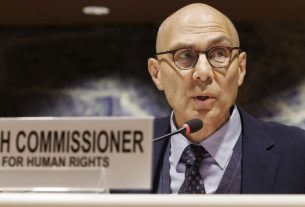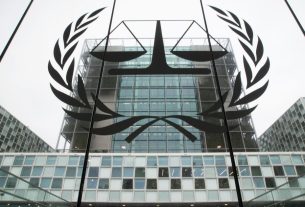DATE LOCATOR:
Oct, 2023,Gaza
SOUNDBITE: Ghassan, video diary
We’ve just been targeted. We’ve just been targeted. We’ve just been targeted by warplanes. We are now with the Red Crescent crews. Thank God for your safety, Firas. Thank you, Firas. No need to worry, we’re okay.
VO:
This is the story of two Palestinian residents, Ghassan and Sara, who sought to escape the violence in Gaza but were trapped in the hostilities and their lives irreversibly changed.
TITLE:
WARNING
This video contains violent images and descriptions
including people injured, and distressing scenes.
Viewer discretion advised.
TITLE:
NOWHERE IS SAFE
TITLE:
GHASSAN
DATE LOCATOR:
Oct, 2023, Gaza
VO:
Since the start of the hostilities, Ghassan has kept a video diary documenting his daily life.
SOUNDBITE: Ghassan, video diary
Jabalia camp is completely isolated from the world, they cut the internet, they cut everything.
VO:
Israel has enforced a tight blockade of Gaza. This has led to a humanitarian catastrophe. And an evacuation system that has unashamedly failed to keep civilians in Gaza safe.
SOUNDBITE: Ghassan
I have here [a video] when they [Israeli forces] dropped leaflets on us to evacuate. Leaflets demanding that we evacuate the area. Here it is clearly as you can see. “Head towards…”
this is the trap I’m talking about.
VO:
For the displacement of individuals to be lawful the following conditions are among those that must be met. Ensure people are moved safely, not separated from their families and have access to food,
water, sanitation and healthcare. The evacuation should be temporary, and displaced people should be free and able to return to their homes as soon as possible after the hostilities end in that area.
Israel’s military has displaced 90 percent of the Gaza population, around 1.9 million people.
VO/ANIMATED MAP:
This map shows the evacuation order on October 13, 2023, directing civilians towards supposed ‘safe zones.’ Human Rights Watch investigated the Israeli authorities’ policies and conduct. We found that repeated evacuations, mass destruction, and failure to provide safe passage or access to food, shelter or medical care make the displacement unlawful.
VO:
The level of intent and evidence of a state policy of forced displacement means these are war crimes
and crimes against humanity.
SOUNDBITE: Ghassan
During that time, there was chaos and panic. The street where I was walking was being
bombed, bombed, bombed everywhere.
SOUNDBITE: Ghassan, video diary
Here we are, displaced in the streets of Jabalia camp. No one knows anything about us,
and we’ve lost all means of communications. We found a car on the street,
and Hisham and I sat inside it. We don’t know where to go, and this car isn’t ours. But we opened its doors and sat inside. If someone finds this phone and we are no longer alive…let them tell the story and broadcast these recordings.
SOUNDBITE: Ghassan
Suddenly, I saw a massive flash…When you are in the epicenter of an explosion, you feel absolutely nothing. You start checking your body to see if you’ve lost any parts of it.
SOUNDBITE: Ghassan, video diary
This place was bombed last night. We are now in the early hours of dawn. I was inside this car. I was hit by shrapnel while sitting inside it. Can’t you see how bad it is [the destruction]? The post office building was targeted. While I was sitting inside this car.
SOUNDBITE: Ghassan
I owe my survival to that car, which shielded us from the blast and the flying shrapnel. Afterward, I decided that we had to escape from the north at least. Our relationship to the camp is our life, it’s [the camp] our whole life.
SOUNDBITE: Ghassan
Displacement feels like your soul is being torn from your body.
SOUNDBITE: Ghassan, video diary
Everyone is evacuating to different places. I just left the camp heading to Rafah after being bombed. We’re riding a donkey-drawn cart because there are no cars.
VO/ANIMATED MAP
The Salah al-Din Road is the main highway that runs north-south through the Gaza Strip. Israeli evacuation orders started on October 13, 2023, running until January, 4, 2024. They instructed people to flee using this road and assured “safe passage.” Later evacuation orders told people to use a different route. Investigations by Human Rights Watch through interviews, satellite imagery, photos and videos demonstrate that this road was rarely, if ever, safe.
SOUNDBITE: Ghassan
Honestly, there are moments when you feel like you are alone on this planet. That day, the electricity was completely cut off from the northern Gaza Strip. And also the water, which the occupation
[Israel] declared they had cut off from Gaza, and the communications and internet networks.
SOUNDBITE: Ghassan
When I reached Rafah, I realized it was a trap. A mousetrap, as we call it. We lived in a house consisting of three floors. Over 200 members of my family had sought refuge in this house.
Imagine, I was sleeping in a space only as large as my body. If I turn to this side, I bump into something and if I turn to the other side, I bump into something.
SOUNDBITE: Ghassan video diary
The bombing continues, with massive destruction and limited resources.
TITLE:
Hamoud, Ghassan’s son
SOUNDBITE: Ghassan video diary
And this is Hamoud.
SOUNDBITE: Ghassan video diary
What do you think of the current situation?
SOUNDBITE: Hamoud, [Ghassan’s son] video diary
Good.
SOUNDBITE: Ghassan video diary
Are you scared of the sounds of bombing?
SOUNDBITE: Hamoud, [Ghassan’s son] video diary
Yes.
SOUNDBITE: Ghassan video diary
What is your wish?
SOUNDBITE: Ghassan video diary
For the war to end.
SOUNDBITE: Ghassan video diary
Where do you want to go?
SOUNDBITE: Ghassan video diary
Do you want to go back home?
SOUNDBITE: Ghassan video diary
Come, Bilal.
TITLE:
Bilal, Ghassan’s son
SOUNDBITE: Ghassan video diary
What’s your wish, Bilal?
SOUNDBITE: Bilal [Ghassan’s son] video diary
To go back home.
SOUNDBITE: Ghassan video diary
Do you want to go back home?
SOUNDBITE: Bilal [Ghassan’s son] video diary
Yes, to eat and drink.
SOUNDBITE: Ghassan video diary
To eat and drink.
SOUNDBITE: Ghassan video diary
We hope the war ends and we return to our homes.
SOUNDBITE: Ghassan
They [Israeli forces] claimed Rafah is a safe area, that Rafah has humanitarian aid. When did aid actually reach Gaza? I spent about a month in Rafah, standing in queues. I stood from 7 a.m. until 2 p.m. to get some bread that I bought with my own money. News started spreading that they [Israeli forces] will invade Rafah, and I lived in the Brazil neighborhood on the border. This mix of news and the psychological state caused by the war forced us to flee. Especially that they [Israeli forces] were
heavily bombing apartments and homes. So, our option was to move into a tent with the rest of the displaced people.
VO:
Under the laws of war, Israel, as the occupying power, is only permitted to temporarily evacuate
people under its control for specific reasons. Israel must allow all the displaced to return once hostilities end. Instead, most of housing and civilian infrastructure has been destroyed so that much of Gaza is uninhabitable. Rather than meet its obligations to put in place basic protections to ensure access to food, water, sanitation and health care. Israel has taken steps to cut them off.
SOUNDBITE: Ghassan
People began fleeing from the displacement camp in Rafah little by little. The camp was so crowded that you couldn’t see the sand because there were so many tents. We arrived here [Deir al-Balah], and as you know, there is no truly safe place in Gaza. The shelling continues in this area. There is no safety. In truth, I don’t recall ever feeling safe since I was displaced from the north. I can’t sleep. My mind is always wandering.
TITLE:
SARA
VO/ANIMATED MAP:
On December 1, 2023, the Israeli military released an interactive map dividing Gaza into 620 numbered blocks and continued to post and distribute evacuation orders referencing this block system. On December 7, 2023, Sara’s family home in Khan Younis was not in a block slated for evacuation. Human Rights Watch interviewed Sara and analyzed satellite imagery, video
and photographs taken from that day. The information gathered indicates that the Israeli military knew or should have known that civilians were living in this block.
TITLE:
An actor’s voice has been used to protect Sara’s identity.
Sara is not her real name.
SOUNDBITE: Sara
The Israeli’s had renamed our area by blocks so everyone could keep track of where there could be strikes, we were living in block G, number 108. At around 4 p.m. I was coming home from work, what I saw as I approached was a massacre, it was hectic, everyone was screaming, and all I could see was fire and destruction. I was scared because my kids were home and my sisters were taking refuge at my house, so we had about 20 people living in our apartment on the third floor. Thank God my family in the apartment were ok, it was the building just next to us that had been hit. There was so much damage to the building I couldn’t enter, I could see bodies, people under the rubble. Many people died that day. Seeing all of this has affected my kids hugely, it changed us all.
VO/ANIMATED MAP:
By analyzing online evacuation orders and photographs of air-dropped leaflets posted online, Human Rights Watch established that block 108 was not designated for evacuation until six-and-a-half weeks after this strike. Human Rights Watch identified at least six additional strikes in this block before the attack on Sara’s relatives’ home which also damaged hers on December, 7, 2023. Just dozens of meters from that attack two additional strikes were carried out in the same timeframe. Analysis of satellite imagery shows that the attack on Sara’s relatives’ home was not an isolated incident.
VO/ANIMATED MAP:
The evacuation system failed to keep people safe. Evacuation orders were inconsistent, inaccurate and frequently not communicated to civilians at all, or with enough time to allow evacuations. The sheer number of Palestinian civilians forced from their homes demonstrates that displacement in Gaza is widespread.
VO:
It is also systematic and intentional and unlawful, forming part of Israeli state policy. This amounts to a crime against humanity. Israel should stop collectively punishing civilians in Gaza. Governments should publicly condemn Israel’s forced displacement of the civilian population as a war crime and crime against humanity and suspend military assistance and arms sales to Israel.
TITLE:
Sara, Actor’s voice
SOUNDBITE: Sara
In previous wars they did target specific places, but we would know in advance, and be given warning. This war is completely different. There is nowhere safe for us to go.
SOUNDBITE: Ghassan
I fear living through another displacement experience, and I fear that winter may come before the war ends. Because this tent you see in front of you won’t hold up in winter. The feeling of loss itself is beyond comparison to any other feeling. I hope…that the time will come when I return to my home,
and I rest my head on my pillow in freedom and peace.
END CREDITS:
Narrator: Nadia Hardman
Producer / Editor: Ellie Kealey
Producers: Gabi Ivens, Carolina Jordá Álvarez, Léo Martine, Ekin Ürgen
Videographer: Yousef al Masharawi
Graphics: Win Edson
Additional footage / Photographs: Ghassan Salem, AFP, IMAGO
Music: Audio Network



